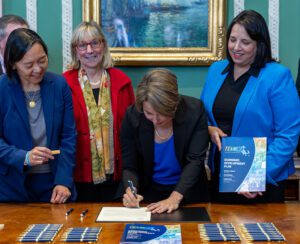Who is a member?
Our members are the local governments of Massachusetts and their elected and appointed leadership.

Secretary of Economic Development Yvonne Hao (far left), Senate President Karen Spilka (center left) and Lt. Gov. Kim Driscoll (far right) join Gov. Maura Healey (center) for a ceremonial signing of the Healey-Driscoll Administration’s economic development plan, entitled “Team Massachusetts: Leading Future Generations,” at the State House on Dec. 12. (Photo courtesy Charlotte Hysen/Governor’s Press Office)
Gov. Maura Healey yesterday signed the administration’s first economic development plan, which aligns its economic development priorities, funding and legislative initiatives within three main areas of focus: investing in the fundamentals to enable economic growth; retaining and attracting talent; and supporting businesses.
The plan will likely provide a foundation for an economic development bill expected to be filed by the governor early in 2024.
At an unveiling event on Dec. 6, Gov. Maura Healey said the plan — Team Massachusetts: Leading Future Generations — outlines a strategy to “put us on a path to future success by powering short- and long-term economic growth, retaining and attracting the world’s best talent, and supporting our businesses,” particularly in sectors like climate technology, life sciences and advanced manufacturing.
Lt. Gov. Kim Driscoll said the plan prioritizes affordability for residents and growing the economy in every region. Economic Development Secretary Yvonne Hao said the administration aspires to ensure that “our state is the best place for people to start and grow their careers and for companies to start and scale, all while being a great place to live.”
The plan prioritizes supporting three areas of focus with specific initiatives:
Fundamentals: Addressing housing and transportation challenges, and investing in infrastructure and competitiveness, including a focus on rural communities by creating a rural designation
Talent: Launching programs to retain and attract talent, including college graduates, immigrants, non-college graduates, and trades/professions
Sectors: Streamlining access to state resources for businesses, advancing leadership in life sciences, health care, advanced manufacturing, robotics and artificial intelligence, and catalyzing new leadership in climate technology as well as tourism and culture.
Healey said more than 1,300 stakeholders, industry leaders, elected officials, and members of the public participated in the plan’s creation. To inform the process, the administration and the Executive Office of Economic Development formed an Economic Development Planning Council in May comprising public and private sector leaders and representatives of key industries, and held regional engagement sessions across Massachusetts. Discussions addressed five areas: business climate, community and neighborhood development, key clusters and innovation, workforce and talent, and equity and opportunity.
A public hearing on the economic development plan before the Legislature is required by statute, and Hao testified on the plan before the Legislature’s Joint Committee on Economic Development and Emerging Technologies at the State House on Dec. 6.
“The majority of our economy is aligned around industries that are growing,” she told the committee. “Health care is growing, life sciences is growing, climate tech is growing, advanced manufacturing is growing, AI is growing, robotics are growing. So we have a ton of tailwinds in growth sectors, and so we just need to make sure that we continue to lengthen our lead and continue to invest and continue to implement all of these initiatives here.”
State law requires the creation of a new economic development plan, and approval by the governor, within the first year of a new administration or term.
The Economic Development Planning Council will organize an annual economic development summit to discuss updates to the plan, progress on initiatives, and concerns.